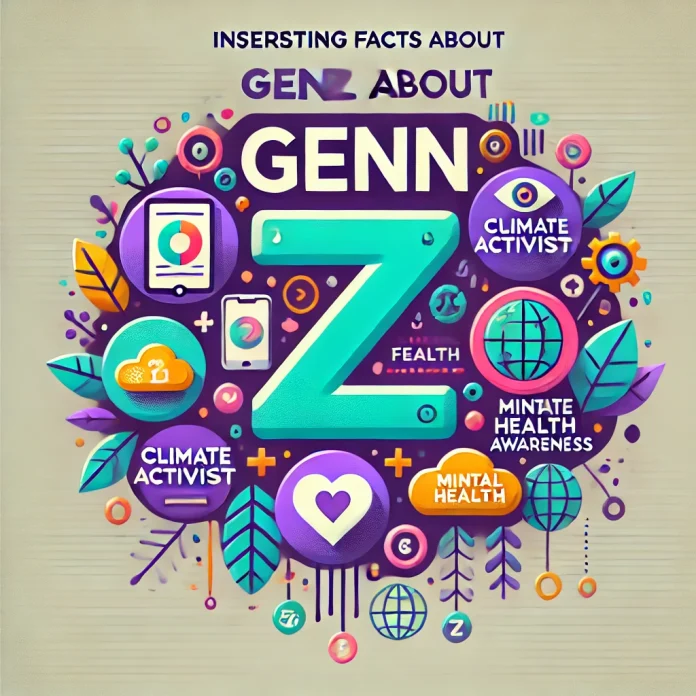Generation Z encompasses people born between 1996 and 2010. This is the second-youngest cohort, between millennials and Generation Alpha. Gen Z identity is shaped by the digital age, climate crisis, anxiety, fluctuating economic landscape, and COVID-19. They are ‘digital natives’ the first generation that grew up wholly immersed in the digital age.
Generation Z is now the second-youngest generation on earth, with the millennials preceding them and Generation Alpha succeeding them. Just like each generation, Gen Z has been influenced by the time that they grew up. Today, the youth are coming of age in a time presided over by climate doom, pandemic lockdowns, and fears of economic crash. The earliest members of Generation Z were born at the point when the Internet had just found a large footing in society.
They are referred to as “digital natives” the first generation to grow up in an era that knew the internet as a natural part of life. Some of the older Gen Zers are now working and maintaining their own homes, while the youngest are still in their pre-teens. As a generation, Gen Z is rapidly growing to occupy more than a quarter of the population of the Asia-Pacific region by 2025. Read on to discover what makes Gen Z tick.
Also read: 50 Gen Z Slang Words That Instantly Make You Sound Cooler
What is a Generation?
You’re probably already familiar with the concept of generations of grandparents, parents, children, and grandchildren defined about you, with all forms of ability and falling into some diffuse category of peers of their own time based on their period and experiences while alive. Social scientists have been studying generations theoretically and manifestly for millennia now. More recently, thinkers like August Comte have been arguing that generational change is the force that drives social change. More specifically, this idea reckons each generation to start entering a new stage of their lives at roughly the same time as an equation that resonates through society to create history.
What makes Gen Z unique?
While there are a lot of differences within the cohort known as Gen Z, there are a few similarities in its members.
As the first real digital natives, Gen Zers speaking generally are extremely online. Gen Zers are known for working, shopping, dating, and making friends online; in Asia, Gen Zers spend six or more hours each day on their phones.
Digital natives generally turn first to the internet when seeking all types of information, including news and reviews before making a purchase. They flit from website to website, short-form app to long-form app, and back again, through social media feeds, each dependent upon the other to form their online ecosystem. Because they were raised with social media, Gen Zers are even more careful when curating their online selves than previous generations and are increasingly drawn toward blanking anonymity, personal feeds, and maintaining a smaller online footprint while actively consuming media.
Video-sharing social media sites have experienced a meteoric rise as Gen Z comes into its own. TikTok currently rules the trends, feelings, and culture of younger Gen Zers, who constitute 60 percent of the app’s one billion–plus users. Gen Zers gather in corners of the internet where they can discuss their passions and interests with others who share them from gaming to K-pop bonding with both people they know in real life and those they’ve met only online.
Gen Z is also generally known for its idealism they’re part of a new wave of “inclusive consumers” and socially progressive dreamers. They believe it is their responsibility to act, both to help stop the acceleration of climate change and for the upliftment of greater equity for all, generally.
Also read: 10 Facts About Millennials: Driving Positive Change for a Better World
What is the status of mental health among Gen Z?
A new crisis of behavioral health is exploding among youths of the so-called Generation Z. US Gen Zers surveyed by McKinsey reported that they see the world with less hope than any generation before. The respondents from Europe coped with self-stigma, too. This bout of pessimism is being stoked by the fires of rising global unrest brought on by wars and disturbances, financial crises, and the interruption of education due to the pandemic. The widespread self-reported “climate anxiety,” with many Gen Zers describing that they think about the fate of the planet each day.
Already, individuals are seeing fewer economic opportunities. They assume that as this older population gets older, social safety nets will be found to be insufficient due to shrinking pensions and increased pressure on individuals saving for retirement. Thus, in the McKinsey survey, 58% of Gen Zers reported that they do not have one basic social need met. This is, in all respects, the largest of any living generation.
On the contrary, Gen Zers claim appreciation for a more nuanced perception of the stigma associated with mental health issues aside from other generations. They seem less inclined to ostracize those with mental illness; at the same time, they may discriminate against themselves.
How is Gen Z different from Millennials?
The Millennials or Zennials are those on the edge of Gen Z and the millennial generation, who were born just ahead of the millennium. Among these are the older Gen Z who have been in the workforce for a few years now and younger millennials who identify more with Gen Z.
Yet, generalizations among the generation are drawn from their experience-set different from those of most millennials. Here are unsettled crowns, this is the part where differences appear between American Gen Zers and the Millennial generation
- They’re pragmatic, with complicated idealisms yet worry about the future. They see themselves in career fulfillment but not without the anxiety of economic struggles.
- Less optimistic about life, they’re also the generation with the lowest levels of emotional and social well-being, followed by earlier generations.
- They are more engaged with their surroundings and interested in belonging to an inclusive supportive community.
- They tend to have an individualistic outlook on personal expression.
- They are active politically and socially, voicing their beliefs through social media.
Also read: Career Catfishing: Why Gen Z Is Ghosting Employers
What values does Gen Z have?
Generally, Gen Zers exhibit strong rational values when it comes to issues of race, justice, internalized racism, and sustainability principles. Movements today affirm such activism from youth; this includes one such movement Global Climate March spearheaded by Gen Z activist Greta Thunberg.
Climate change remains very high on the list of issues of utmost concern to Gen Zers. Their call for reforms moves across a spectrum from personal, public, and global perspectives to prevent future catastrophes. Many Gen Zers are self-proclaimed environmentalists, and most of them look for companies and organizations to see commitments to sustainability.
Gen Z is also living through a time of intense inflation and unfortunate financial conundrum. The rising tide of the student loan ranks is another thorn for many members of this generation.








